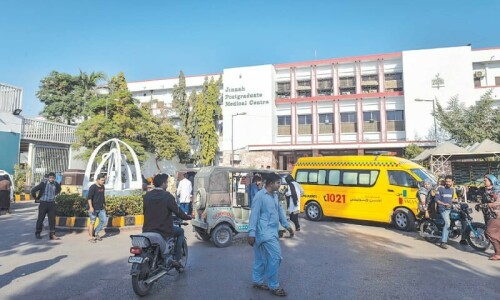KARACHI: Dispelling the general perception that Pakistan is a water-stressed country, the Federation of Pakistan Chambers of Commerce and Industry (FPCCI) is of a firm belief that there is only a crisis of proper usage and mismanagement rather than anything else.
Suggesting different measures needed for proper usage and controlling of wasteful use of water, the apex body of trade and industry is also of a view that the present inflow of water in the Indus basin is the same as it was in the pre-Tarbela Dam era, ie 42 years ago.
An eight-member team of experts was given a task by the FPCCI for preparing a report on ‘Water management, floods, transport and aquatic tourism’.
Spread over 76 pages, the report prepared by the experts also suggests setting up of an Inland Water Transport Authority (IWTA).
The report says that Pakistan is highly dependent on water for the livelihood of its 220 million people.
The country receives about 145 million acre feet (MAF) of water annually from three major rivers — Indus, Jhelum and Chenab and their tributaries, including Kabul River. But only 103 MAF reaches canal heads for irrigation while the remaining flows to the sea.
The report dispels the general impression that Pakistan is faced with severe water shortages and states that out of 103 MAF at canal heads, only 26 MAF water is used for crop cultivation while the remaining is lost through seepage, evaporation, escape below Kotri, leakage from the outmoded infrastructure, mismanagement and corruption.
Furthermore, unlevelled fields, old water distribution system (warabandi) and outdated irrigation methods such as flood irrigation also contribute to water losses at large scale.
The report suggests that there is an urgent need to go for drip irrigation in order to conserve water.
The lining of water courses should be completed at the earliest because so far work on 72,000 water courses has been completed and remaining 73,000 water courses still need lining. This will save water up to 23 MAF which will further increase the availability of water for major crops of the country, the FPCCI report adds.
The report advises the government to devolve water distribution systems to local bodies and other local stakeholders to end the stranglehold of ‘corrupt’ bureaucrats who facilitate illegal extraction of water. This will help save up to 15 MAF.
Similarly, construction of small dams, reservoirs and ponds should be done by elected local bodies and farming communities in districts, tehsils and villages to conserve water up to 15 MAF.
The tube wells in rural and urban areas should be regulated for maintaining water tables and aquifers.
Once efficient water management and conservation of water is made possible, it will be easy to introduce nationwide inland water transport for which IWTA be established as no such body is there at the federal or the provincial levels, the report further suggests.
The report supports the initiative of the former chief justice of Pakistan and the prime minister on Diamer-Bhasha dam, which will store 8.1 MAF of water.
Published in Dawn, April 10th, 2019












































Dear visitor, the comments section is undergoing an overhaul and will return soon.